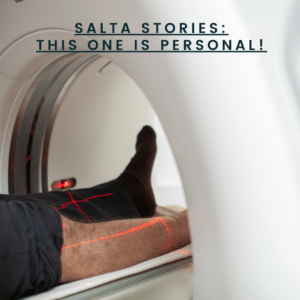Hello everybody, and welcome to the COVID Camper! This is Dr. John Blanchard from Michigan. I am a family physician here. Today is April 30th and its day number 37 in the camper. I am glad to say that the numbers have come down quite a bit in Michigan and we are continuing to decrease. At Beaumont hospital we are down to about 600 admissions compared to when we peaked at 1,200 admissions. So, the hospitalizations are also decreasing.
I want to emphasize that this decline has been because of the quarantine, and everyone should be congratulated with this. Without the quarantine the numbers would have been extraordinarily higher. There are still a lot of people on the internet talking about how COVID is not as dangerous as influenza and that the quarantine was not necessary. Every area of the country is a little different, but certainly here in Michigan the quarantine really prevented, I think a catastrophe. Everyone should be commended for following the stay-at-home order. Hopefully next month, by mid-May the quarantine will be lifted.
I want to talk a little bit about what to expect when the quarantine is lifted. We have learned a lot about this virus. It is much harder to contract it from the air than it is from touching something with your hand and then touching your nose or mouth. So, when the quarantine is lifted it is important to wear a cloth mask when you are out in public, maintain a six-foot distance, wash your hands when you come home, use hand sanitizer when you are out, and continuing to practice those good hygiene measures. This will really reduce the likelihood of contracting the virus. We also know that warmer climates and UV radiation like sunlight really kills the virus quickly. So, coming into summer I think that should really help us as well.
A lot of people have put off medical care at this time. If you have chronic conditions such as diabetes, hypertension, high cholesterol or have had health problems going on it is time to start thinking about getting back into your doctor. Start thinking about getting your yearly physical, the yearly comprehensive evaluation, taking care of your chronic care needs, seeing your doctor for routine or urgent type of visits. When you go to the doctor there should be protocols in place where you have social distancing, wearing a mask, remain six-foot distance, no crowded waiting rooms, and have less patients in the office at one time. However, there are growing concerns that people are putting off their medical care and chronic condition management due to the quarantine and this could increase the risk of problem going forward.
One of the positive things that I hope comes out of this is the knowledge of mindfulness. This idea of identifying when we are falling into thought distortions. One of the thought distortions that I want to talk about today is the most common by far, mind reading. Mind reading is a thought distortion that we think of what others are thinking of us. We don’t, we imagine it in a way that they’re critical about the way we look or the way we act or any number of things that we think people may judge us about. We must be really careful about falling into mind reading and thought distortion and think clearly that we truly do not know what others are thinking. Instead look at what people say and how they act towards you, don’t image what you think they think of you. This is an important thought distortion.
One thing I really love about being a direct primary care doctor is that I hear a lot of complaints about people in the traditional health care setting. It seems as if they can never establish care with one doctor. They either choose a doctor and they go to that office and then they see a different doctor each time or provider like a physician assistant or nurse practitioner instead of having a continuity of care relationship with one provider. I think this is incredibly important for healthcare that a trusting relationship forms between a doctor and their patient. The patient knows the doctor cares about them, knows them, and has a long-term relationship. We also hear patients talking about they have to change doctors because their doctor is no longer in their network and that creates fragmentation of care, and we think there should be a long-term relationship with a doctor. This is what we do at SALTA and that is how direct primary care works for me!
If you want to learn how direct primary care can work for you, feel free to call Kyle at 248.922.3076. Kyle can answer all your questions and see what six of our locations is best for you or your company near you! You can also follow us on Facebook @salta_directprimarycare. OR you can search us on Google stating, “direct primary care near me!” or join right on our website at saltadirect.com
Stay safe out there! Love each other and we will see you again soon!




